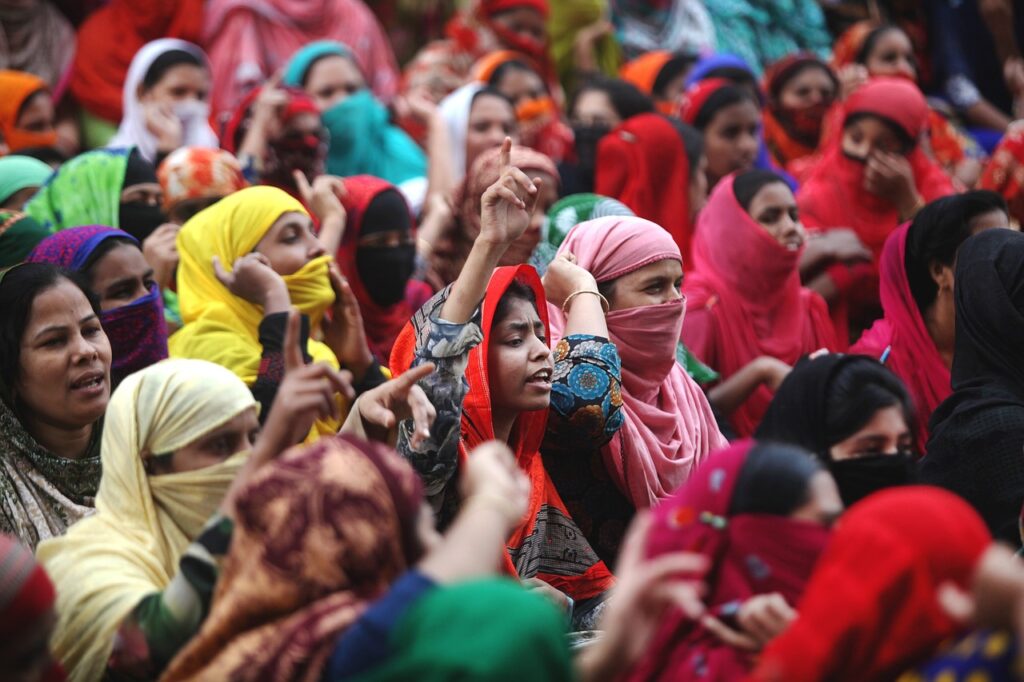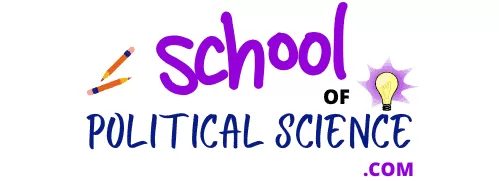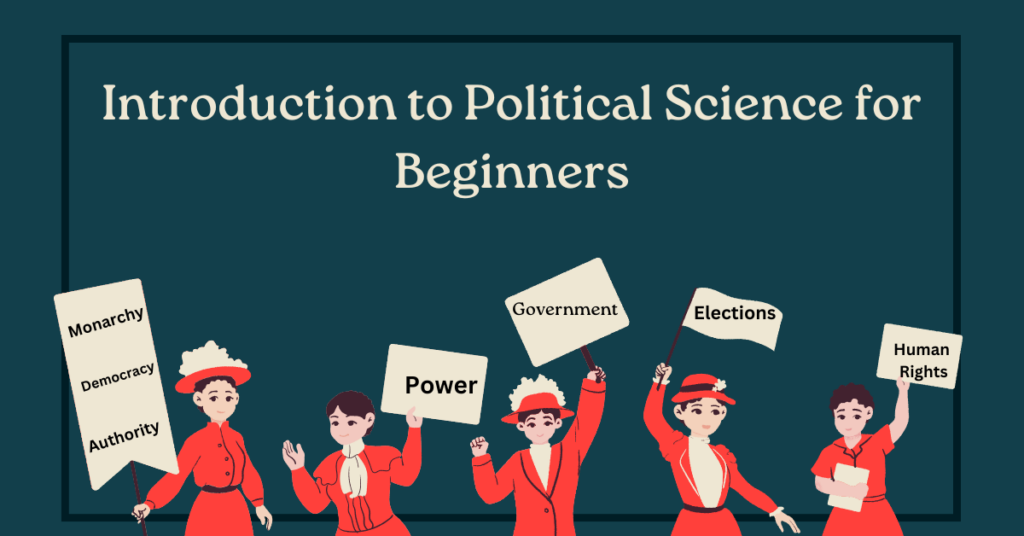Political science studies governments, political systems, and how decisions are made in society. It helps us to understand laws, policies, and leadership. Every country has a political system that shapes how people live.
By learning political science, we can become more informed citizens and take part in shaping our communities. This article aims to provide an easy-to-understand introduction to political science for beginners.
What is Political Science?
Political science is a field that focuses on how governments work, how leaders make decisions, and how people influence politics. It covers elections, laws, public policies, and international relations. Political science also examines how power is used and how different political systems function (Heywood, 2019).
Must Read- Political Science: Meaning, Nature, Scopes, and Importance [7 points]
Why is Political Science Important?
Studying political science helps you to:
- Understand how governments make decisions.
- Analyze laws and policies that affect our daily lives.
- Learn about different political systems worldwide.
- Participate in democracy by voting and discussing (Hague & Harrop, 2021).
For example, if a government raises taxes, political science helps us understand who benefits, who is affected, and why the decision was made.
Read More- 10 Importance of Political Science You Should Know
Branches of Political Science
Political science has several key areas that focus on different aspects of politics:
1. Political Theory
Political theory looks at ideas and philosophies about politics. Thinkers like Plato, Aristotle, and Karl Marx developed theories about governance, democracy, and justice. These ideas still influence governments today (Held, 2006).
Must Read– Political Theory: Why Should We Study It?
2. Comparative Politics
This branch compares different countries’ political systems to understand how governments are functioning. For example, the U.S. has a presidential system, while the U.K. has a parliamentary system. Studying these differences helps us learn why some countries have stable governments while others face instability (Lijphart, 2012).
3. International Relations
International relations focus on how countries interact with each other. It examines issues like trade, diplomacy, war, and treaties. For example, political scientists study how international agreements like the Paris Climate Agreement influence global policies (Baylis, Smith, & Owens, 2020).
Must Read– Meaning, Nature and Scope of International Relations
4. Public Administration
Public administration deals with how governments run services such as healthcare, education, and transportation. It looks at how officials manage resources and serve the public effectively. For example, how a government handles disaster relief is a part of public administration (Rosenbloom, Kravchuk, & Clerkin, 2018).
Must Read–Public Administration: Meaning, Nature, 2 Scope, and Significance
5. Political Economy
Political economy studies how politics and economics interact. It looks at how government policies affect the economy and vice versa. For instance, discussions about raising the minimum wage involve both political and economic factors (Gilpin, 2001).
Must Read- The Relationship Between Political Science and Economics: 5 Key Points
6. Public Law
Public law focuses on legal rules that govern society, including constitutional law and civil rights. For example, Supreme Court decisions on issues like free speech or equality impact national laws (Epstein & Walker, 2019).
For in-depth insight on the “Branches of Political Science” I recommend reading this article- “7 Branches of Political Science and Their Importance“.
Key Political Science Concepts
To better understand political science, here are some important ideas:
1. Government
A government is an organization that creates and enforces laws. Different types of government include:
- Democracy: Citizens vote to choose their leaders (e.g., the U.S., India).
- Authoritarianism: Power is concentrated in one leader or a small group (e.g., North Korea).
- Monarchy: A king or queen rules, sometimes with a parliament (e.g., the U.K.) (Shively, 2018).
2. Power and Authority
- Power is the ability to influence people.
- Authority is the legal right to use power. For example, a teacher has authority in a classroom, but a popular student may have power over their classmates (Weber, 1947).
Must Read– 10 Key Differences Between Power and Authority
3. Political Parties
Political parties are groups that compete to control the government. In the U.S., the two major parties are the Democratic and Republican parties. In India, parties like the Bharatiya Janata Party (BJP) and the Indian National Congress (INC) play a major role (Duverger, 1954).
4. Elections

Elections allow citizens to choose their leaders. A fair election is essential for democracy to function. Political scientists study election systems to improve fairness and representation (Norris, 2014).
How Political Science Affects Daily Life

Political science isn’t just about theories—it impacts everyday life. Here’s how:
- Voting: Knowing political science helps people make informed choices.
- Government Policies: It helps us analyze laws and policies that affect us.
- Human Rights: Political science promotes awareness of issues like freedom and equality.
- Economy: It helps us understand how government policies influence jobs and wages (Easton, 1965).
For example, if a government introduces a new healthcare policy, political science helps us evaluate whether it benefits everyone fairly.
Conclusion
Political science is an important subject that helps us understand how governments work and how people influence politics. Learning about political systems, policies, and global affairs allows us to be better citizens. Whether it’s voting in elections, understanding government decisions, or following international news, political science plays a key role in shaping society. (Goodin, 2009).
This introduction to political science for beginners provides a basic understanding of the subject. As you explore further, you will discover how political science influences every aspect of our lives.
let me share with you what you have learned from “Introduction to Political Science for Beginners “
References
- Baylis, J., Smith, S., & Owens, P. (2020). The Globalization of World Politics. Oxford University Press.
- Dahl, R. A. (1998). On Democracy. Yale University Press.
- Duverger, M. (1954). Political Parties: Their Organization and Activity in the Modern State. Methuen.
- Easton, D. (1965). A Framework for Political Analysis. Prentice-Hall.
- Epstein, L., & Walker, T. G. (2019). Constitutional Law for a Changing America. CQ Press.
- Gilpin, R. (2001). Global Political Economy: Understanding the International Economic Order. Princeton University Press.
- Goodin, R. E. (2009). The Oxford Handbook of Political Science. Oxford University Press.
- Hague, R., & Harrop, M. (2021). Comparative Government and Politics. Red Globe Press.
- Held, D. (2006). Models of Democracy. Stanford University Press.
- Heywood, A. (2019). Politics. Macmillan International Higher Education.
- Lijphart, A. (2012). Patterns of Democracy. Yale University Press.
- Norris, P. (2014). Why Electoral Integrity Matters. Cambridge University Press.
- Rosenbloom, D. H., Kravchuk, R. S., & Clerkin, R. M. (2018). Public Administration: Understanding Management, Politics, and Law in the Public Sector. McGraw Hill.
- Shively, W. P. (2018). Power and Choice: An Introduction to Political Science. Rowman & Littlefield.
- Weber, M. (1947). The Theory of Social and Economic Organization. Free Press.

